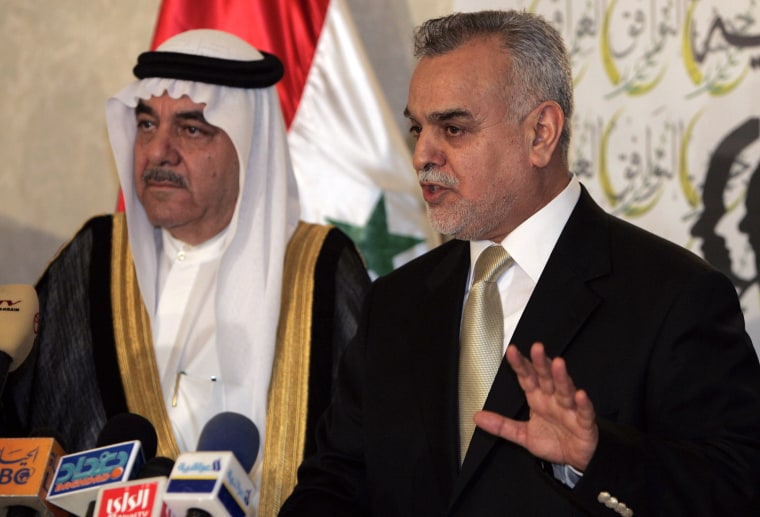Iraq’s largest Sunni Arab bloc said Wednesday it has suspended its membership in Prime Minister Nouri al-Maliki’s coalition government, dealing a new setback to the Shiite leader’s efforts to achieve national reconciliation.
The Iraqi Accordance Front, which has six Cabinet members as well as 44 of parliament’s 275 seats, said it was giving al-Maliki a week to meet their demands or it would quit his 14-month-old Cabinet altogether.
“The Accordance Front announces the suspension of its membership in the government,” Sheik Khalaf al-Elyan said at a news conference attended by the two other leaders of the three-party Accordance Front — Vice President Tariq al-Hashemi of the Iraqi Islamic Party and Adnan al-Dulaimi of the Congress of the People of Iraq. Al-Elyan leads the National Dialogue Council.
List of demands
Reading from a prepared statement, al-Elyan said the front’s demands included a pardon for security detainees not charged with specific crimes, a firm commitment by the government to human rights, the disbanding of militias and the inclusion of all parties in the government in dealing with the country’s security situation.
The Sunni ministers already had been refusing to attend Cabinet meetings but said Wednesday they would stop going to work, effective immediately. The Accordance Front members of government include the deputy prime minister for security as well as the ministers of planning, higher education, culture, defense and the minister of state for women’s affairs.
The move was the latest in a series of boycotts by minority Sunnis and followers of a radical Shiite cleric.
The boycotts have left al-Maliki’s Shiite-dominated government increasingly fragile at a time when it’s under mounting pressure from Washington to meet a series of political benchmarks ahead of a key report to Congress in September by U.S. Ambassador Ryan Crocker and top U.S. commander in Iraq Gen. David Petraeus.
Al-Maliki had no immediate comment on Wednesday’s development.
Sunni legislators and Sadrists lifted a separate boycott of the 275-member parliament last week in an apparent bid to ensure they would retain influence in the debate over power-sharing bills before an August legislative vacation.
'Alliance of moderates' threatened
The decision also threatened to undermine weeks of behind-the-scene negotiations to form a coalition of moderate parties from all sects — dubbed “the alliance of moderates.” So far only two Shiite and two Kurdish parties have signed up and they had been urging al-Hashemi’s moderate Islamic Party, the country’s largest Sunni Arab group, and independent Shiites to join them.
Wednesday’s decision by the Accordance Front signaled that al-Hashemi had opted not to abandon his Sunni allies for the sake of joining the new group, which was to exclude al-Hashemi’s militant partners as well as the Sadrists.
In remarks at the news conference, however, al-Hashemi left open the possibility of joining the new alliance if the participants made an unequivocal announcement of “goodwill.”
“There are no encouraging indications so far,” al-Hashemi said, adding he had informed President Jalal Talabani of the Accordance Front’s decision to suspend its Cabinet membership on Tuesday.
A statement by Talabani’s office suggested that the Kurdish president sought to dissuade al-Hashemi from breaking with al-Maliki’s government in their meeting the previous day.
Iran-U.S. talks
Iran, meanwhile, said it was ready to consider high-level talks with the United States regarding security in Iraq, the official Islamic Republic News Agency reported Wednesday.
“The issue of negotiations between Iran and the U.S. about Iraq at the level of deputy foreign ministers is reviewable,” the agency quoted Iranian Foreign Minister Manouchehr Mottaki as saying after a cabinet meeting in Tehran.
Mottaki’s statement came a day after a tense meeting between the American and Iranian ambassadors to Iraq in Baghdad in which the parties agreed to set up a security subcommittee to carry forward talks on restoring stability in the wartorn nation.
Mottaki said “necessary studies will be undertaken” in case a “formal request” is made by the U.S. for new, higher level talks on Iraq.
But underscoring the rising tensions between the two foes, the U.S. ambassador reiterated accusations that Iran is fueling the violence in Iraq by arming and training Shiite militias. He warned Tuesday that no progress could be made unless Iranian actions change on the ground.
Iraq’s fragile government has been pressing for more contacts between the two nations with the greatest influence over its future.
Iranian power
Iran holds considerable sway in Iraq, where the majority of the population is also Shiite Muslim and where many Shiite political parties are seen as having ties to Tehran.
In fighting Wednesday, a joint U.S.-Iraqi force backed with helicopter gunships clashed with suspected Shiite militiamen during a raid of several homes in eastern Baghdad. Six people were killed and 10 wounded, police said.
Associated Press Television News video footage showed the funerals of the six being held at Sadr City, a sprawling Baghdad district and a stronghold of the Mahdi Army, the Shiite militia loyal to radical cleric Muqtada al-Sadr.
The footage also showed the site where the clashes took place, with several houses and at least one car on a narrow alley damaged. Small pools of blood could be seen on the alley and against the outer walls of the houses.
Rear Adm. Mark Fox, a U.S. military spokesman, said American forces “take great measures to protect innocent people,” but civilians were endangered by militants who hide among them.
South of Baghdad, a senior police officer in the Shiite holy city of Karbala escaped an assassination attempt Wednesday when a roadside bomb targeted his five-car convoy while he was on his way to work, police said.
Karbala police chief Brig. Raid Shakir Jawdat was not injured, but three of his guards were killed, according to police in Karbala, an area about 50 miles south of Baghdad that has been relatively peaceful compared to the capital.
